What You Need to Know About Pristiq and Effexor (Desvenlafaxine and Venlafaxine)
What is Pristiq?
Pristiq is the brand name of desvenlafaxine succinate, a chemical variant of the widely-prescribed antidepressant venlafaxine (brand name Effexor). Pristiq is a serotonin-norepinephrine reuptake inhibitor (SNRI), meaning it increases the activity in the brain of two neurotransmitters, serotonin and norepinephrine. Pristiq is approved for the treatment of clinical depression in the United States and Canada.
The Pristiq Secret
Wyeth manufactures both Pristiq and its relative Effexor, one of the most profitable antidepressants currently on the market. Effexor is now available as generic venlafaxine from other manufacturers. Pristiq, on the other hand, remains protected by patent. Because of the patent situation, it is in Wyeth’s best financial interest to promote Pristiq as being different from Effexor/venlafaxine. But is it really that different, or is it just the same medication in another form?
This question is surprisingly difficult to answer. Chemically, desvenlafaxine is an active metabolite of venlafaxine. In other words, inside the body, venlafaxine breaks down into desvenlafaxine, and this form of the chemical is effective in the body. The question that must be answered by clinical studies is (a) whether desvenlafaxine is effective as an antidepressant, (b) whether desvenlafaxine is more effective than venlafaxine and other antidepressants, and (c) how the side effects of desvenlafaxine compare to the side effects of other antidepressants.
Many short-term clinical studies have shown that question (a) is true: desvenlafaxine has been proven to be more effective than placebo at improving depression symptoms. Question (b) has not been answered clearly. Desvenlafaxine is good, but is it better than the alternatives? The most recent reports suggest that it is about the same (Clayton et al. 2009; Thase et al. 2009). Some doctors believe that Pristiq is therefore not very useful (for example, Sopko et al. 2008), but others disagree (for example, Kamath & Handratta 2008).
Question (c) may take the longest time to answer, especially in relation to long-term effects. Clinical studies include relatively small numbers of people. Very rare side effects may not show up at all in a clinical study. Typically, very rare side effects of medications are only discovered after the medication has been on the market for some time and many people have tried it.
Is Pristiq Dangerous?
From May 2008, when Pristiq first became available in the United States, through the end of that year, the FDA received over 1200 “adverse-event reports” for the drug, ranging from nausea and fatigue to death from heart attack and suicide. These reports were submitted via the FDA’s Adverse Event Reporting System (AERS).
AERS reports, however, are limited. In order to be reported, no proof is required that the suspect agent (in this case, Pristiq/desvenlafaxine) actually caused the problem. Also, the reports are a collection of anecdotes that cannot be analyzed statistically. The FDA uses the reports to decide whether further studies are needed about the safety of an approved medication.
Currently, the FDA still considers Pristiq safe enough to remain on the market.
If You Are Taking Pristiq
Do not discontinue this medication before consulting your doctor. Sudden discontinuation after even a short time can cause both withdrawal symptoms and worsening of depression symptoms. Instead, if you have questions about whether you should continue taking Pristiq, take your concerns to the health care provider (psychiatrist, nurse practitioner, etc.) who originally prescribed it.
The information in this article should not be considered medical advice. The information presented here is not meant to treat, diagnose, prescribe or cure any disease. Always consult your doctor before you start, stop or change anything that has been previously prescribed.
References
- Clayton et al. in CNS Spectr. 2009 Apr;14(4):183-95.
- Kamath & Handratta. “Desvenlafaxine succinate for major depressive disorder: a critical review of the evidence.” Expert Rev Neurother. 2008 Dec;8(12):1787-97.
- Sopko, Ehret, and Grgas. “Desvenlafaxine: another ‘me too’ drug?” Ann Pharmacother. 2008 Oct;42(10):1439-46.
- Thase et al. in CNS Spectr. 2009 Mar;14(3):144-54.
Image credit: “Pristiq pills” by Tom Varco. (CC) Some rights reserved.
